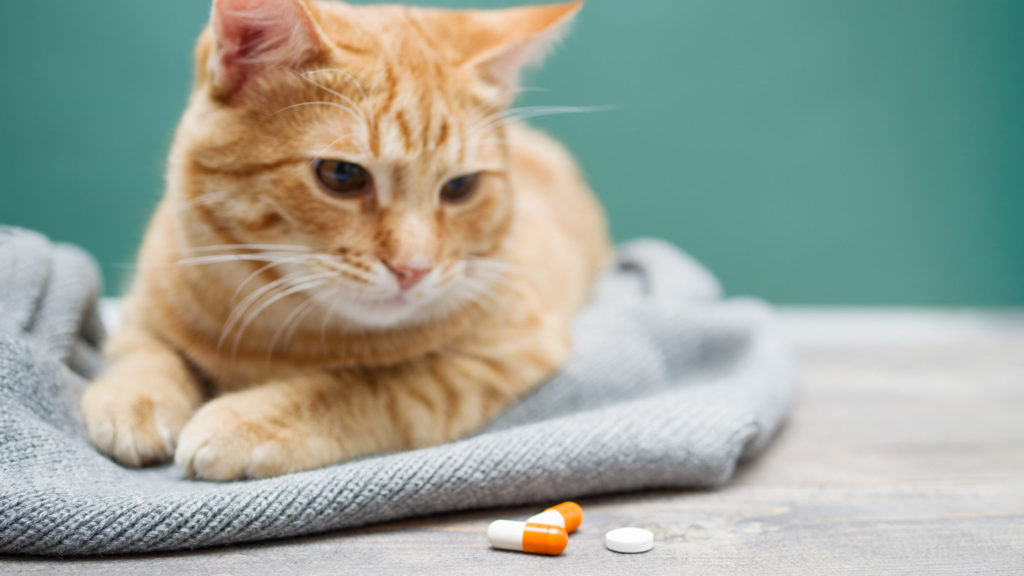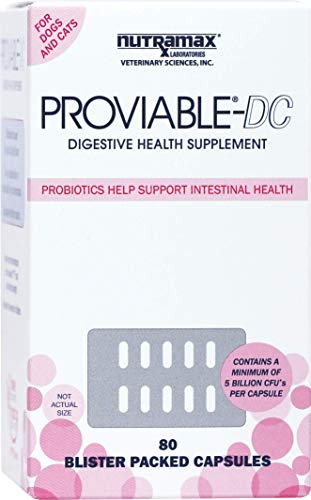How To Choose The Best Probiotic for Cats For Your Cat – CatTime

Cats can experience a wide range of advantages from taking a regular probiotic. It’s not just about gut health, either. Positive effects on the overall health of your feline are attributed to the administration of a probiotic. Whether your veterinarian has recommended one, or you’re looking to aid in the wellbeing of your cat, this guide will assist you in selecting the best option.
Best Choice
Best choice for your cat
Pros:
This probiotic works as a dietary supplement to support general good health. It also can be used to treat diarrhea and soft stool issues in cats and kittens. The microencapsulation feature allows for a stable product that will be absorbed by your cat’s digestive system. It comes in a powder form designed to be sprinkled on food – no fighting to force pills down your cat’s throat. It also allows you to adjust the amount you give to your cat as needed.
Cons:
While the powder form can be a blessing for some cat parents, it can present a struggle for others. If your cat is extra picky about supplements in its food, this formula can be challenging to get them to eat. In some cases, a pill form is the least complicated method of delivery.
Best Intestinal Balance
Supports your cat's intestinal health
Pros:
Billions of microorganisms are delivered to your cat’s digestive system with the use of these pills, giving its gut health the chance to balance out. As such, it works well for felines with chronic issues and sensitive stomachs. The ingredients include seven essential probiotics that are proven to improve a myriad of digestive problems in cats. It can help cats with vomiting issues, as well. The sprinkle formula takes the pill problem out of the equation for pet parents with finicky cats.
Cons:
According to the labeling, this product should not be exposed to temperatures higher than 77F. The reaction the product has to temperatures can be a problem during the shipping process, as exposure to higher temperatures can render the probiotics ineffective. This product is also a probiotic in powder form. A cat who turns up its noses at anything different in its food may be better off with a probiotic capsule. For short-term use, the brand advises using the powder in conjunction with their KP paste.
Best Food Probiotics
Feed your cat's unique needs
Pros:
This probiotic is a clear and easy choice for cat parents who face significant difficulties getting cats to take supplements. The food comes in three flavors, all of which are sure to please even the most finicky of palates. Each formula supports digestive health with added vitamins, minerals, and live probiotics. It can also be a solution for cats with food allergies that manifest as sensitive and itchy skin.
Cons:
While most cats love this food formula, there is no pleasing some felines. A change in food can cause them to go on a hunger strike, no matter how appealing it is. Also, this food should be transitioned to slowly from your cat’s former diet to decrease the chances of intestinal upset. Unlike a supplement, it will take a little more time to see results.
Best Probiotic Powder
Helps maintain a healthy immune system
Pros:
Every packet of this supplement contains 200 million colony-forming microorganisms. The microorganisms help to create a microflora environment in your cat’s body that encourages optimal health. It also includes extra vitamins and minerals that work in conjunction with probiotics to get your cat’s digestive tract in the best shape possible. Advita works well for cats who have recently had surgery, had antibiotics, or were dewormed.
Cons:
Cats might not want to eat food that has this powder probiotic sprinkled on it. For purposes of treating IBS and other gastrointestinal disorders, it is unclear whether or not this product will be as effective as others. The powder can be grainy, making it even more challenging to get picky cats to eat it.
Best Probiotic Shampoo
For healthier looking skin and coat
Pros:
This shampoo is both pH balanced and packed with good bacteria for your cat’s skin health. Sensitive kitties who struggle with dry, cold air, humidity, or allergies will feel better after a bath in this shampoo – even if they hate the tub itself. Omega 3s and avocado oil are included in the ingredients, giving you a product that is gentle yet powerful in fighting symptoms like excessive itching, chewing, and hot spots. It also helps your cat’s coat shine at its best.
Cons:
The biggest downside of this probiotic is it has to be delivered via bath. Every cat owner knows how much of a fiasco bathtime can be – especially when the claws come out. The biggest hurdle to overcome when administering this probiotic is to get through the bathing part.
What Really Matters?
Delivery Methods
A probiotic isn’t going to do much good if you can’t get your cat to swallow it. It can take a few tries before you find a formula that your cat will eat – or a capsule that you manage to get down your cat’s throat. Each method poses a set of issues. Powder probiotics will go over well with many cats, but some refuse to eat food that has been changed in any way. Other cats might fight tooth and nail if you try to give them a pill. Probiotic shampoos solve this issue, but also create the chore of bathing a cat. It’s essential to learn what is most comfortable for you and your feline when giving probiotic supplements.
Shelf-Life
Probiotics require some extra care to keep them effective. It’s essential to pay attention to expiration dates, as they don’t last as long as other types of supplements and vitamins. Most probiotics have specific instructions regarding storage and temperatures. Following these instructions will help prolong the life of the probiotics and ensure that your cat is getting its full dose. Most probiotics need to be stored at a temperature of 77F or below. The temperature restrictions means shipping can cause problems in hot climates and summer months. Make sure if you have probiotics shipped, they won’t be exposed to too high of a temperature en route to you. Otherwise, they might arrive damaged to the point that they won’t work for your cat.
Versatility
It’s helpful to know precisely what you’re hoping to solve by giving your cat a probiotic. Is it to help rebalance its stomach after an illness or deworming? Is it to combat food allergies and sensitivities? Is it for general well being? Ideally, the probiotics you try should encompass each of these things, so you don’t need to go shopping for something specific and hard to find. The probiotics covered in this guide offer solutions to many different digestive issues your cat may face. Another thing to be aware of is if they are safe for cats of all ages, including kittens. If you are seeking to supplement your kitten with a probiotic, make sure the one you choose is approved for younger felines.
What’s in Right Now?
Probiotics are considered a supplement for cats, and as such, they often need to be administered in pill or powder forms. Powder probiotics for cats are the more popular choice since every cat parent knows that cats are extra tricky when it comes to giving medications. The powder formulas allow cat moms and dads to sprinkle the supplement over food, which most cats then usually eat. . There are no pills to deal with, no angry cats, no scratched hands. There is a small downside in that some cats won’t cooperate with the powder, either. Luckily, probiotic foods designed to help gut health and sensitive skin are another popular option. Cat food enriched with probiotics is not only helpful in getting your cat to take them – it helps assure that your cat is getting proper dosage. Each of these options available for cat probiotics is continually improving, making it easier to give your cat a critical supplement.
Prices
Expensive
$28-38. This price range of cat probiotics offers trusted brand names, as well as high amounts of live and active cultures. How long these probiotics will last you depend on how much you need to give your cat, but they are at least a one-month supply for a single cat. Many probiotics in the expensive range come in powder form.
Mid-Range
$18-20. Moderately-priced probiotics still pack a powerful punch when it comes to the number of microorganisms. You’ll find more than just supplements in this price range. There are also shampoos designed to help cats who suffer from allergies or sensitive skin.
Cheap
$14-19. More affordable probiotics can be just as effective as more expensive ones, although they might be a smaller supply, which won’t last as long. Probiotic foods can also be found in this price range, which is ideal if other probiotic options have not gone over well with your cat thus far.
FAQs
How do I know if my cat needs a probiotic?
Your vet is the best person to advise if you’re unsure if your cat needs a probiotic. However, they tend to be a gentle supplement with few side effects. There are a few indicators that your cat could require a probiotic. If they suffer from too hard or too loose stools, a probiotic can often solve the issue. Constipation is another case where probiotics may be helpful. Cats who have undergone medical procedures, have been dewormed recently or finished a round of antibiotics may suffer from gastrointestinal upset. Probiotics can assist in getting a cat’s GI system back on the right track. Cats diagnosed with IBS tend to need long-term probiotic supplements.
Can I give a kitten probiotics?
A good rule of thumb is that kittens who are eating solid food exclusively should have no issues with probiotics. Always check the label of the probiotic you intend to give a kitten to be sure. For very young or orphaned kittens, it’s best to get a vet’s advice before giving them probiotics. Stray or orphaned kittens frequently have issues with parasites and malnutrition. Proper treatment alongside probiotics can help clear the problem and the symptoms. However, ask a vet about dosage and frequency first.
How do I give my cat powder probiotics?
Powder form probiotics should be sprinkled on your cat’s food or favorite snack, according to the instructions. When giving powder supplements, remember to check the bowl for any residue after your cat has finished eating. Sometimes, they manage to avoid the bulk of the powder by moving the food around its dish and do not get the full dose. Wet food can help make sure your cat doesn’t miss any of its probiotic powder.
My cat ate too many probiotics. Now what?
If you accidentally gave your cat an extra dose of probiotics, don’t panic. It takes a lot of probiotics to cause any harmful side effects. Your cat would have to eat several times the daily recommended dosage to see any ill effects. Even then, the worst that will probably happen is excess gas. In some cases, “good” bacteria can cause temporary constipation if taken in too high of a dose.
Why Trust Us
Since 2008, CatTime has provided millions of cat owners with all the information they need to keep their pets happy and healthy. Our experts know exactly what it takes to raise our furry friends and our goal is to help all owners, new or experienced, care for their cats with all the right food, toys, equipment, and accessories.






